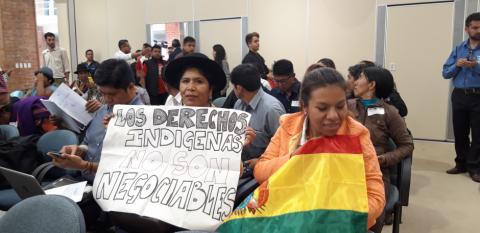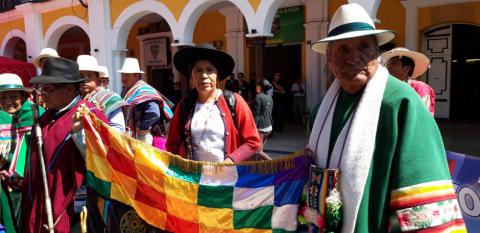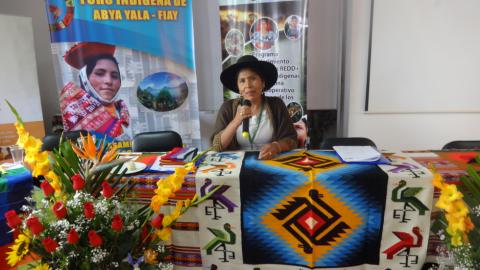
How parallel reporting strengthened indigenous women leadership in Bolivia
Interview with Toribia Lero Quispe, General Secretary, Andean Coordinator of Indigenous Organizations - CAOI
- Describe your experience and current work using parallel reporting.
In Bolivia we felt that the government wasn’t listening to our demands and discriminated against us for being indigenous women. The government has undertaken many measures that are damaging to indigenous communities. We developed parallel reports and presented them to the Committee for the Elimination of All Forms of Discrimination against Women (CEDAW) as well as for the Universal Periodic Review (UPR).
Our reports are based upon a collection of cases in which we prioritized compliance with the requirement of free, prior and informed consent of indigenous people (especially the effective participation of women in these processes, and the consultation in our local languages), access to justice by indigenous women in relation to land and natural resources, the right to education with an intercultural perspective, and data generation with an intersectional focus. We worked transparently with the communities throughout the entire process: from the collection of cases and the structuring of the report, to its presentation to international bodies and the recommendations’ implementation.
- Please share one or two successful experiences with parallel reporting.
We’ve been building agendas since 2003 and we’ve developed a process known as “indigenous diplomacy” which is a training process to understand how we can bring what’s happening in our communities to international spaces. Some people with experience in indigenous diplomacy began to explain to us what different organizations do, how we could use this and what advantages we could gain to advance our struggles.
In 2014, Bolivia was going to be evaluated for the first time in the Universal Periodic Examination (UPE), and it was also going to be reviewed by CEDAW. Indigenous women in our organization focused on preparing a parallel report for CEDAW. We defined our priorities, and after identifying the key issues, we began prioritizing the most iconic cases that would substantiate our report. We held meetings in the highlands (Andes) and lowlands (Amazon) with local women. We also decided to prioritize some topics that were very important to us:
- Effective realization of free, prior and informed consent consultations, with the implementation of mechanisms to guarantee women’s wide, informed and effective participation, since we were not being included in the consultation lists and had no participation at all before this point.
- Consultations in our indigenous languages and not only in Spanish.
- Access to justice in relation to land and natural resources, where women usually face more obstacles.
- Preservation of traditional knowledge and realization of the right to education of indigenous women (intercultural education in local languages), in such a way that our own languages and knowledge are preserved.
- Integration by the State of an intersectional approach and disaggregation of its statistical reports by gender, ethnic identity and other aspects that allow us to better understand the situation of women.
Based on this list of prioritized issues, we began doing research. We designed an interview format and started reaching out to communities who wanted to participate. We saw that there were not many existing elements that we could use as evidence because the government publishes official figures which are not often aligned with reality, especially since the information is not disaggregated for indigenous women. We decided to collect testimonials, and we documented our own experiences as indigenous women leaders. We also made alliances in seeking support to translate into English what we wanted to express and present to CEDAW, and to make contacts in Geneva that would help ensure that we could be present during Bolivia’s review.
- How was the parallel reporting process helpful to your work and what did it enable you to do or achieve? What were some limitations or challenges?
The completion of the shadow report was a process, and carrying it out involved a tremendous learning experience for us that has greatly strengthened our movement, particularly indigenous women’s leadership. Some of our most relevant breakthroughs are: consultations must be carried out in our own languages and respecting our traditions; women must be effectively consulted, and the State must disaggregate information by gender and ethnic identity when providing official figures or statistical analysis about the human rights situation.
Indigenous sisters from our communities have learned to lobby before international bodies, and we have learned to use these mechanisms in such a way that we ourselves have presented reports about our own experiences and our needs and demands as indigenous women. I remember that when we presented our first report to CEDAW, ours was the only indigenous women's organization there that presented its report. As a result, many colleagues have now begun to explore parallel reporting, and it’s no longer seen as something beyond our reach.
These processes have also strengthened our definition as a community (47 communities have reorganized themselves), and especially the articulation and strong alliances between indigenous female sisters. We have reorganized ourselves and we have the right and the responsibility to defend our territories. This process generated a process of constant communication with the communities from which the cases were obtained, reporting progress and accounting for how collaborative work had borne many fruits. In this way, we have continued with our advocacy, and we are promoting indigenous youth leadership processes, in which indigenous diplomacy is present as a means of transmitting this experience and knowledge. We have also become more familiar with the use of the internet and virtual tools, and in some cases we have decided to resume our education.
Parallel reporting has also helped us strengthen communities defending their territories. They have one more tool with which to confront the State and multinationals. Consultation should not end with the community as a whole, but should specifically engage women who should be approached in their own language. These recommendations have also been adopted by the communities, in light of their participation in the preparation of the parallel report, and we have successfully explained the grounds for each recommendation.
Some of the obstacles that we found in this process and can highlight are:
- Collecting the cases and writing the report took a great deal of effort by everyone. In terms of resources, we faced many difficulties, because the cases were collected in remote regions. On top of which, advocacy for the implementation of the recommendations is conducted in the capital.
- Government’s narrative to delegitimize the struggles of indigenous peoples and our work as human rights defenders. This tended to reinforce their refusal to make efforts to implement the Committee's recommendations.
- The close relationship of some NGOs with the government prevented us from making certain alliances out of respect for our own political consistency.
4. What have you done to implement your conclusions?
Dialogue with the government has been very complicated in this regard, since the authorities didn’t want to listen to us nor implement the recommendations we obtained from CEDAW. We have continued our parallel reporting as a tool to continuously lobby and monitor the government, in such a way that in subsequent reports we highlighted the persistence of certain human rights violations by the government as well as its failure to implement the recommendations.
On the other hand, when the government undertakes mining projects, we advocate using these recommendations. They work as a weapon for us, since they force the government to adopt them if it wishes to develop this type of project.
The direct effect that these bodies have upon governments and the potential of indigenous communities to participate in civil society has been very important for demanding the implementation of the recommendations. The CEDAW Committee visited Bolivia in 2015 to explain the recommendations, and governmental institutions were present.
Finally, we have continued our work in these communities, because it’s very important that they continue employing these tools in order to demand acknowledgment when needed. We continue to hold meetings in the communities. It gives people hope to see their case reach an international audience, because if the government does not listen to you, other organizations will.
- What suggestions would you give other members who are considering a parallel reporting process with United Nations bodies?
To all sisters defending our lands, I would say that we have to search for all possible mechanisms to defend our territory. Parallel reporting before CEDAW, the ESCR Committee, the UPR, among others, is especially important. These agencies receive our complaints, and in cases like CEDAW it impacts all women, whether or not they participated. These recommendations serve to protect our rights and our territories. This is also a process that strengthens the leadership of women and puts us in a horizontal position with the State.
To develop this process we have to prepare ourselves, and we must also protect ourselves, since we can face many risks while collecting our cases, structuring the report and interacting with the communities around this process. We have to think about how to protect ourselves.
I also want to highlight the importance of continuing to demand that the State adopts an intersectional approach in all its statistical reporting, and to disaggregate data by gender and ethnicity, among other aspects.


